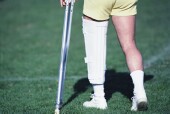 |
 |
 |

Do Antidepressants Make Bones Brittle?
Studies suggest an increased fracture risk in people who take the medications|
|
HealthDay
Friday, July 11, 2008
 FRIDAY, July 11 -- (HealthDay News) -- Older adults may get a needed mood boost from a prescribed antidepressant, but they're also at increased risk for bone fractures, a growing number of studies suggest.
FRIDAY, July 11 -- (HealthDay News) -- Older adults may get a needed mood boost from a prescribed antidepressant, but they're also at increased risk for bone fractures, a growing number of studies suggest.
In one of the latest reports, Leslie Spangler, a researcher at Group Health, a Seattle-based health plan, found that antidepressant use in postmenopausal women, who averaged 64 years of age, was linked to an increased risk of fractures of the spine and other sites.
"Our study didn't show any strong association between antidepressants and wrist fractures and hip fractures," she said. "It did find an association with spine fracture."
Those women on antidepressants had a 30 percent increased risk of spine fracture, she said, and a 20 percent increased risk of any type of fracture.
Spangler's team based its findings on a review of data from more than 93,000 women enrolled in the large Women's Health Initiative Observational Study. First, the researchers looked at antidepressant use, then they looked at the incidence of fractures. The findings were published in the May issue of the Journal of General Internal Medicine.
In an earlier study, Dr. David Goltzman, director of the McGill Centre for Bone and Periodontal Research at McGill University in Montreal, looked at data from an osteoporosis study that included more than 5,000 randomly selected people, including 137 who took antidepressants known as selective serotonin reuptake inhibitors, or SSRIs, daily. The researchers found that daily SSRI users had twice the risk of bone fracture as those who didn't take the drugs.
Serotonin is a brain chemical linked to depression. It's also involved in the physiology of bone, said Goltzman, who added that if you change that system, you can get low bone density, boosting fracture risk. His research was published in 2007 in the Archives of Internal Medicine.
Other research has also uncovered a link between depression itself and an increased risk of fractures.
Goltzman said he and his colleagues are now looking at teens who take SSRIs, to see if there are any effects from the drugs on growing bones. The researchers want to determine if there's a genetic predilection for osteoporosis, the brittle bone disease that can lead to fractures, that's induced by the antidepressants.
While the studies suggest an association between antidepressant use and fractures, no research has found a cause-and-effect relationship, Spangler said.
Charlie McAtee, a spokesperson for Eli Lilly and Company, which makes the popular SSRI Prozac (fluoxetine), agreed with Spangler that "the current data does not allow a definitive conclusion that fluoxetine contributes significantly to the risk of osteoporosis and fractures in fluoxetine-treated patients."
The link has been seen before, McAtee said. "The Prozac label does list osteoporosis as an event observed in clinical trials," he said. "This is listed as a rare (less than 1 in 10,000) occurrence."
Until more is known, Goltzman offered this advice: "I would advise individuals on SSRIs not to stop their medication if they are receiving the drugs for valid reasons. They should, however, strongly consider seeing their physician to be evaluated for osteoporosis, including having a bone density test done."
To help reduce the possibility of bone loss, whether you take antidepressants or not, bone health experts at the Mayo Clinic offer the following suggestions:
- Get enough calcium. All men and women older than age 65 should try to get 1,500 milligrams of elemental calcium a day.
- Get enough vitamin D. Men and women should get at least 800 international units (IU) daily.
- Exercise. You should couple strength-building with weight-bearing exercises, such as walking, stair climbing and skipping rope.
- Be sure to get soy in your diet. The plant estrogens in soy help maintain bone density and may reduce the risk of fractures.
- Don't smoke -- it leads to bone loss.
- Don't drink alcohol to excess. More than two drinks a day may reduce bone formation and limit the body's ability to absorb calcium.
HealthDay
Copyright (c) 2008 ScoutNews, LLC. All rights reserved.
Related News:
More News on this Date
Related MedlinePlus Pages:
| Home | Health Topics | Drugs & Supplements | Encyclopedia | Dictionary | News | Directories | Other Resources | |
| Disclaimers | Copyright | Privacy | Accessibility | Quality Guidelines U.S. National Library of Medicine, 8600 Rockville Pike, Bethesda, MD 20894 National Institutes of Health | Department of Health & Human Services |
Date last updated: 14 July 2008 |




